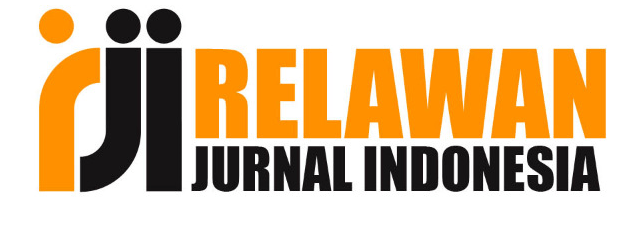PENYULUHAN: PENGENALAN PENYAKIT INFEKSI CORONA VIRUS 2019 (COVID – 19)
Abstract
The COVID-19 pandemic is a devastating disaster for all inhabitants of the earth. All segments of human life in every country are disturbed, without exception in the field of education. Many countries have decided to close schools, colleges and universities, including Indonesia. The government in almost every country, including Indonesia, had to make a bitter decision to close every education sector to reduce close contact between school members so that it could save lives, or still have to open schools in order to survive their workers so that maintaining economic sustainability. There are two impacts on the sustainability of education caused by the Covid-19 pandemic. The first is the short-term impact, which is felt by many families in Indonesia, both in cities and in villages. In Indonesia, many families are not familiar with doing school at home. Home schooling for Indonesian families is a big surprise, especially for the productivity of parents who are usually busy with work outside the home. Likewise with the psychological problems of students who are accustomed to learning face to face with their teachers. All elements of education in social life are "exposed" to illness due to Covid-19. Implementation of continuous teaching online. This process runs on a scale that has never been measured and tested because it has never happened before. Including in remote villages where the population of school age is very dense, it becomes completely confused, because the information technology infrastructure is very limited. Assessment of students online and there is a lot of trial and error with an unpredictable system, in fact many assessments have been canceled. The second is the long-term impact. Many groups of Indonesian society will be exposed to the long-term impact of Covid-19, the long-term impact of education is an aspect of justice and an increase in inequality between community groups and between regions in Indonesia. (Aji, R.H.S, 2020), the aim of this activity is to increase public knowledge regarding the 2019 Corona Virus (COVID - 19) infectious disease so that the public cares more about health after knowing more about this infectious disease. The implementation method consists of the preparation, implementation, monitoring and evaluation stages. Participants are the general public and students. Stages Starting from the activity of preparing permits for the head of STIKes and the Deputy Chairperson and the LPPM to get permission to socialize health to students. At the implementation stage, this community service activity was carried out online with a zoom meeting by providing counseling regarding information on the introduction of the 2019 Corona Virus infection disease (COVID - 19). The monitoring and evaluation phase of activities using the postest method is to determine the increase in the level of student knowledge after health education is carried out by directing students to fill out a google form media questionnaire about the 2019 Corona Virus infection disease (COVID-19). Almost all participants were able to attend extension events very well. During counseling, participants are very active in asking the speakers regarding the material that has been delivered. All Participants seemed enthusiastic about participating in outreach activities and asked a lot about information related to the 2019 Corona Virus (Covid - 19) infectious disease. The majority of outreach participants consist of students who are spread from several health campuses and non-health campuses. From the counseling results it was known that many of the participants understood and knew more about information related to the 2019 Corona Virus (Covid - 19) infectious disease.
ABSTRAK
Pendahuluan: Pandemik COVID-19 merupakan musibah yang memilukan seluruh penduduk bumi. Seluruh segmen kehidupan manusia disetiap negara terganggu, tanpa terkecuali bidang pendidikan. Banyak negara memutuskan menutup sekolah, perguruan tinggi maupun universitas, termasuk Indonesia. Pemerintah di hampir setiap negara, termasuk Indonesia harus mengambil keputusan yang pahit menutup setiap sektor pendidikan untuk mengurangi kontak secara erat antar warga sekolah sehingga dapat menyelamatkan hidup, atau tetap harus membuka sekolah dalam rangka survive para pekerjanya agar menjaga keberlangsungan ekonomi. Terdapat dua dampak bagi keberlangsungan pendidikan yang disebabkan oleh pandemik Covid-19. Pertama adalah dampak jangka pendek, yang dirasakan oleh banyak keluarga di Indonesia baik di kota maupun di desa. Di Indonesia banyak keluarga kurang familier melakukan sekolah di rumah. Bersekolah di rumah bagi keluarga Indoensia adalah kejutan besar khususnya bagi produktivitas orang tua yang biasanya sibuk dengan pekerjaannya di luar rumah. Demikian juga dengan problem psikologis peserta didik yang terbiasa belajar bertatap muka langsung dengan para pengajar meraka. Seluruh elemen pendidikan secara kehidupan sosial “terpapar” sakit karena covid-19. Pelaksanaan pengajaran berlangsung dengan cara online. Proses ini berjalan pada skala yang belum pernah terukur dan teruji sebab belum pernah terjadi sebelumnya. Termasuk di desa-desa terpencil yang berpenduduk usia sekolah sangat padat menjadi serba kebingungan, sebab infrastruktur informasi teknologi sangat terbatas. Penilaian peserta didik secara online dan banyak trial and error dengan sistem yang tidak ada kepastian, malah banyak penilaian yang banyak dibatalkan. Kedua adalah dampak jangka panjang. Banyak kelompok masyarakat Indonesia yang akan terpapar dampak jangka panjang dari covid-19 ini, dampak pendidikan dari sisi waktu jangka panjang adalah aspek keadilan dan peningkatan ketidaksetaraan antar kelompok masyarakat dan antar daerah di Indonesia. (Aji, R.H.S, 2020) Tujuan: tujuan kegiatan ini adalah untuk meningkatkan pengetahuan masyarakat terkait penyakit infeksi Corona Virus 2019 ( COVID – 19 ) sehingga masyarakat lebih peduli tentang kesehatan setelah mengetahui lebih jauh terkait penyakit infeksi ini. Metode : Metode pelaksanaan terdiri dari tahap persiapan, pelaksanaan, monitoring dan evaluasi. Peserta yaitu masyarakat umum dan mahasiswa. Tahapan Dimulai dari kegiatan mempersiapkan perizinan kepada ketua STIKes dan Wakil Ketua serta LPPM untuk mendapatkan izin sosialisasi kesehatan kepada mahasiswa. Pada tahap pelaksanaan, kegiatan pengabdian masyarakat ini dilakukan secara daring dengan zoom meeting dengan cara memberikan penyuluhan terkait informasi pengenalan penyakit infeksi Corona Virus 2019 ( COVID – 19 ). Tahap monitoring dan evaluasi kegiatan dengan metode postest untuk mengetahui peningkatan tingkat pengetahuan mahasiswa setelah dilakukan penyuluhan kesehatan dengan cara mahasiswa diarahkan mengisi kuesioner media google form tentang penyakit infeksi Corona Virus 2019 ( COVID – 19 ). Hasil : Hampir seluruh peserta mampu mengikuti acara penyuluhan dengan sangat baik. Saat penyuluhan, peserta sangat aktif bertanya kepada pemateri terkait materi yang telah disampaikan. Semua Peserta terlihat antusias mengikuti kegiatan penyuluhan dan banyak menanyakan tentang informasi yang berkaitan dengan penyakit infeksi Corona Virus 2019 ( Covid – 19 ). Peserta penyuluhan mayoritas terdiri dari mahasiswa yang tersebar dari beberapa kampus kesehatan maupun kampus non kesehatan. Dari hasil penyuluhan diketahui bahwa banyak dari peserta yang paham dan mengetahui lebih lanjut tentang informasi yang berkaitan dengan penyakit infeksi Corona Virus 2019 ( Covid – 19 ) ini.
Full Text:
PDFReferences
Aji, R.H.S. 2020. Dampak Covid-19 pada Pendidikan di Indonesia: Sekolah, Keterampilan, dan Proses Pembelajaran. Jurnal Sosial & Budaya Syar-i: UIN Syarif Hidayatullah Jakarta. DOI: 10.15408/sjsbs.v7i5.15314.
World Health Organization. 2020. Report of The WHO-China Joint Mission on Coronavirus Disease2019. Geneva: World Health Organization.
Wu F, et al. 2020. A new coronavirus associated with human respiratory disease in China. Nature. 579:265–9.
DOI: https://doi.org/10.52031/jam.v2i1.127
Refbacks
- There are currently no refbacks.




